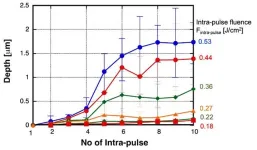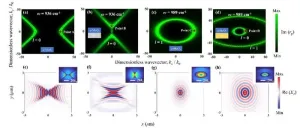(Press-News.org) WINSTON-SALEM, N.C. – July 8, 2024 – Researchers at Wake Forest University School of Medicine have been awarded a five-year, $27 million grant from the National Institute on Aging (NIA), part of the National Institutes of Health (NIH), to renew funding for MESA-MIND, an ancillary study to the Multi-Ethnic Study of Atherosclerosis (MESA).
In 2018, researchers at Wake Forest University School of Medicine received more than $18 million from the NIA to launch MESA-MIND to study the connections between heart health and brain health.
“In MESA-MIND, we are studying how heart health contributes to brain health in diverse groups of people,” said Timothy Hughes, Ph.D., associate professor of gerontology and geriatric medicine at Wake Forest University School of Medicine and the principal investigator of the study.
MESA was initiated in 1999 to study the characteristics of subclinical cardiovascular disease – disorders of the heart or blood vessels detected before the appearance of any clinical signs or symptoms – as risk factors that predict progression to actual cardiovascular disease. The MESA study, funded by the National Heart, Lung and Blood Institute (NHLBI), part of the NIH, included more than 6,800 people of European, African, Hispanic and Chinese descent who were between the ages of 45 and 84 and healthy at the time of enrollment.
“With this additional funding support from the NIA, we will further study the role heart and vascular factors play in developing brain abnormalities common in aging and Alzheimer’s disease that lead to cognitive impairment and dementia,” Hughes said. “We are especially interested in studying these risk factor differences in racially and ethnically diverse groups who are at higher risk for both Alzheimer’s disease, stroke and cardiovascular disease.”
Since 2018, the MESA-MIND study has enrolled more than 2000 MESA participants to receive cognitive testing and brain imaging over two visits. The new grant from NIA will fund two additional visits over the next five years.
The research team will collaborate with 17 institutions around the country, including the six sites in the United States where MESA sees participants.
Cardiovascular disease is a known risk factor for dementia later in life, but exactly how it contributes Alzheimer’s disease and other dementias is unknown. Hughes said that early subclinical changes in structure and function of blood vessels appear to affect brain vessels and the clearance of blood proteins linked to Alzheimer’s disease and related dementias.
“MESA has built the necessary infrastructure to examine the structural, functional and molecular ways that vascular disorders emerge in the body and brain,” Hughes said. “Now, we hope to identify the pathways that link subclinical vascular disorders to Alzheimer’s disease and related dementias.”
END
NIH awards Wake Forest University School of Medicine $27 million to study vascular health and its impact on cognition
Five-year renewal grant from the National Institute on Aging will support ancillary study to the Multi-Ethnic Study of Atherosclerosis (MESA)
2024-07-08
ELSE PRESS RELEASES FROM THIS DATE:
College of Public Health receives NIH grant to pilot AI chatbot for African Americans with depression
2024-07-08
As a leader in innovative health solutions, George Mason University’s College of Public Health received a National Institutes of Health (NIH) AIM-AHEAD program grant to pilot an artificial intelligence (AI) chatbot for Black and African Americans with depression. Health Informatics Professor Farrokh Alemi will enhance his first-of-its-kind, evidence-based artificial intelligence tool to address the medication needs of African Americans with depression.
The existing AI tool recommends antidepressants for 16,775 general-population patient subgroups, each representing a unique combination of medical history. For each of ...
RCMAR Annual Meeting promotes mentorship and research on aging
2024-07-08
The latest Annual Meeting convened by the Resource Centers for Minority Aging Research (RCMAR) National Coordinating Center, held in Arlington, Virginia, from June 26 to 28, centered on the theme of transforming diverse aging research through inspiring and mentoring scientists.
Current and former RCMAR scientists presented research findings from completed pilot studies and progress updates for ongoing research. The meeting included several professional development sessions for the scientists and members of RCMAR ...
Exploring distress experiences of patients with sickle cell disease
2024-07-08
COLUMBUS, Ohio – While distress is well-documented in patients with sickle cell disease, sources of distress and how patients manage distress have not been well explored.
“Our study found that the most profound source of distress for patient with sickle cell disease in a home visit program was anticipating and going to acute care centers to manage their acute pain,” said senior study author Maryanna Klatt, PhD, director of the Center for Integrative Health at The Ohio State University Wexner Medical Center.
Study findings are published ...
Super-resolution machining of single crystalline sapphire by GHz burst mode femtosecond laser-induced plasma assisted ablation
2024-07-08
A new publication from Opto-Electronic Advances; DOI 10.29026/oea.2024.240029 , discusses super-resolution machining of single crystalline sapphire by GHz burst mode femtosecond laser-induced plasma assisted ablation.
GHz burst-mode femtosecond (fs) laser, which emits a series of pulse trains (burst pulse) with extremely short intervals of several hundred ps, offers distinct characteristics in materials processing as compared with conventional fs laser (single-pulse mode). The authors of this article have demonstrated that the GHz burst mode fs laser greatly improves ablation efficiency, quality and speed. GHz burst mode fs laser was further applied ...
Boosting UV light absorption in 2D semiconductor with quantum dot hybrids for enhanced light emission
2024-07-08
A new publication from Opto-Electronic Advances; DOI 10.29026/oes.2024.240002 , discusses boosting UV Light Absorption in 2D Semiconductor with quantum dot hybrids for enhanced light emission.
Two-dimensional (2D) transition metal dichalcogenides (TMDs) have emerged as a promising class of materials due to their remarkable properties. These materials, such as monolayer tungsten disulfide (1L-WS2), are just a few atoms thick, yet they possess intriguing electronic and optical characteristics that make them highly attractive for various applications, from flexible electronics ...
The forbidden propagation of hyperbolic phonon polaritons and applications in near-field energy transport
2024-07-08
A new publication from Opto-Electronic Advances; DOI 10.29026/oes.2024.230053 , discusses forbidden propagation of hyperbolic phonon polaritons and applications in near-field energy transport.
Manipulating photons on the nanoscale to develop integrated and miniaturized optoelectronic devices as well as photonic chips has been a strong pursuit of the nanophotonics community. Among them, phonon polaritons supported by two-dimensional layered van der Waals (vdW) materials, which have emerged in recent years, have attracted much attention by virtue of their ultra-long lifetimes, ultr-low losses, and strong confinement capabilities, ...
Researchers find common immune system mechanism between pregnancy, cancer
2024-07-08
For more information, contact:
Nicole Fawcett, nfawcett@umich.edu
734-764-2220
For immediate release
ANN ARBOR, Michigan — To understand why some cancers successfully circumvent the immune system to grow unchecked, researchers turned to pregnancy.
“In pregnancy, the immune system does not reject the growing fetus, so we know there must be mechanisms active in the placenta. In cancer, it’s the same thing: the growing tumor is not rejected by the immune system. It means the cancer cells have developed strategies to suppress immune rejection, same as in pregnancy,” said Weiping ...
UC San Diego health offers novel gene therapy for bladder cancer
2024-07-08
UC San Diego Health is the first health system in San Diego County to offer a new bladder-saving gene therapy to treat localized bladder cancer.
The novel treatment is the first and only FDA-approved gene therapy delivered directly into the bladder for non-muscle-invasive bladder cancer (NMIBC). Called nadofaragene firadenovec (Adstiladrin), the gene therapy addresses an unmet need for patients who are no longer responding to the longstanding first line of defense — bacillus calmette-guerin (BCG), a bacteria-based immunotherapy for cancer management. While BCG is a common first therapy, it can eventually stop working, ultimately leading to complete bladder removal.
The American ...
SETI Institute awards its first research and education innovation grants
2024-07-08
July 8, 2024, Mountain View, CA – Today, the SETI Institute announced the first projects it will fund with a new program to Support Technology, Research, Innovation, Development, and Education programs – or STRIDE. The SETI Institute established the $500K STRIDE fund for SETI Institute researchers and EOC (Education, Outreach, and Communications) professionals to develop innovative research and education proposals. The first five grants awarded will support projects that:
analyze Earth’s colors and climate to create detectors for studying exoplanets
develop a multi-backend capability for ...
Study reveals environmental impact of artificial sweeteners
2024-07-08
The human body’s inability to break down sucralose, an artificial sweetener found in many zero-calorie food and drink products, is well established by scientific research. The compound is so stable that it escapes wastewater treatment processing and is in drinking water and aquatic environments.
“We can't break down sucralose, and a lot of microorganisms can't break it down, either, because it's a really tough molecule that doesn't degrade easily. So there are a lot of questions about how it is affecting the environment ...
LAST 30 PRESS RELEASES:
Scientists show how to predict world’s deadly scorpion hotspots
ASU researchers to lead AAAS panel on water insecurity in the United States
ASU professor Anne Stone to present at AAAS Conference in Phoenix on ancient origins of modern disease
Proposals for exploring viruses and skin as the next experimental quantum frontiers share US$30,000 science award
ASU researchers showcase scalable tech solutions for older adults living alone with cognitive decline at AAAS 2026
Scientists identify smooth regional trends in fruit fly survival strategies
Antipathy toward snakes? Your parents likely talked you into that at an early age
Sylvester Cancer Tip Sheet for Feb. 2026
Online exposure to medical misinformation concentrated among older adults
Telehealth improves access to genetic services for adult survivors of childhood cancers
Outdated mortality benchmarks risk missing early signs of famine and delay recognizing mass starvation
Newly discovered bacterium converts carbon dioxide into chemicals using electricity
Flipping and reversing mini-proteins could improve disease treatment
Scientists reveal major hidden source of atmospheric nitrogen pollution in fragile lake basin
Biochar emerges as a powerful tool for soil carbon neutrality and climate mitigation
Tiny cell messengers show big promise for safer protein and gene delivery
AMS releases statement regarding the decision to rescind EPA’s 2009 Endangerment Finding
Parents’ alcohol and drug use influences their children’s consumption, research shows
Modular assembly of chiral nitrogen-bridged rings achieved by palladium-catalyzed diastereoselective and enantioselective cascade cyclization reactions
Promoting civic engagement
AMS Science Preview: Hurricane slowdown, school snow days
Deforestation in the Amazon raises the surface temperature by 3 °C during the dry season
Model more accurately maps the impact of frost on corn crops
How did humans develop sharp vision? Lab-grown retinas show likely answer
Sour grapes? Taste, experience of sour foods depends on individual consumer
At AAAS, professor Krystal Tsosie argues the future of science must be Indigenous-led
From the lab to the living room: Decoding Parkinson’s patients movements in the real world
Research advances in porous materials, as highlighted in the 2025 Nobel Prize in Chemistry
Sally C. Morton, executive vice president of ASU Knowledge Enterprise, presents a bold and practical framework for moving research from discovery to real-world impact
Biochemical parameters in patients with diabetic nephropathy versus individuals with diabetes alone, non-diabetic nephropathy, and healthy controls
[Press-News.org] NIH awards Wake Forest University School of Medicine $27 million to study vascular health and its impact on cognitionFive-year renewal grant from the National Institute on Aging will support ancillary study to the Multi-Ethnic Study of Atherosclerosis (MESA)





